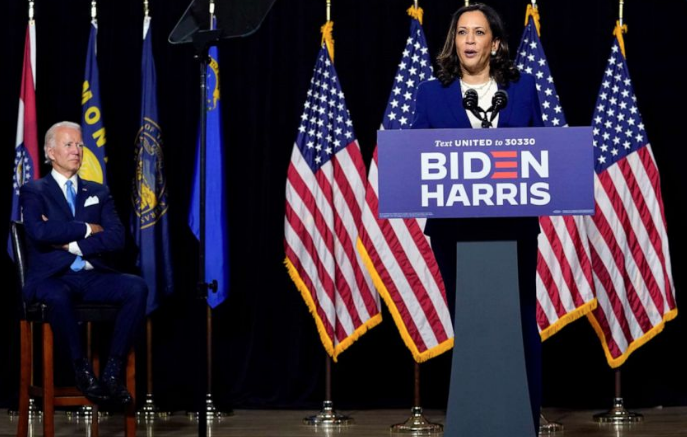Dear Indians, Kamala Harris Isn’t One Of Us; She Left That Identity Long Ago


Let’s not obsess about Kamala Harris or her Indian-Hindu roots.
She left that long ago when she decided to become a politician.
The nauseating Indian media commentary on Kamala Harris, Joe Biden’s choice for running mate in the November US Presidential election, is more a comment on our yet-to-be-decolonised Hindu minds. To pretend that she is one of ours, due to her having had a Tamil mother, shows complete lack of understanding of what she stands for.
Harris, whose father was a Jamaican Black, identifies herself more as an American person of colour (especially if that colour is black), and this was evident even from her sister Maya’s tweet: “That day when a little girl from Oaktown became the first Black woman to be a major party VP candidate – so incredibly proud of you sis.” No mention here of Harris’ Indian links. That is to be hushed up, lest ordinary Americans realise she may not be one of them.
In the American political landscape, Kamala’s success depends on emphasising her patriarchal lineage that goes down well with Afro-Americans and Left-liberals – a key support base for the Democratic party in a race-scarred nation. This may be why even her sister did not see the need to emphasise their Hindu roots on the mother’s side. Kamala sees herself as a Black Baptist. This may be why she could not show any great enthusiasm to help prosecute Christian clergy accused of sex crimes.
Harris was San Francisco’s district attorney, and later Attorney General for California when these issues were being hotly debated. She is currently the junior senator from this state. A mixed-race politician has to prove she is more loyal than the queen to succeed in Protestant America. Only as a Black can she speak her mind, for Afro-Americans are exempt from having to be politically correct.
The Democratic party, in a desperate bid to ensure Donald Trump’s defeat, had to scrape the bottom of the political barrel to come up with a 77-year-old has-been as its Presidential nominee. Joe Biden’s only two qualifications were that he was “not Trump” and that he was less Left than the other Democratic frontrunners (Bernie Sanders, Kamala Harris, Elizabeth Warren, etc) – something the Democratic party’s financial backers would not have been comfortable with.

But having chosen Biden to become the oldest American President ever (he will be 78 by the time he takes over in January 2021, if he wins), the party also needed a balancing factor in race-racked America. A Black woman fits the bill perfectly. Kamala Harris was not chosen for any other reason beyond balancing the ticket.
If the Democrats had been truly inclusive and not merely looking for the token person of colour to run for top office, they could have chosen the most attractive candidate of them all – Tulsi Gabbard – but then who would want to elect a “Devil-worshipper” in evangelical Christian America? Especially one who congratulated Narendra Modi after his second election win in 2019?
She was demonised as sympathetic to Hindutva and Hindu nationalism, and the vocal backing of a large contingent of Hindu Americans did not help her cause. Her biggest opposition came as much from the Indian media in India as from the evangelical and Left-wing parts of American media. Anti-Hindu religious bigotry runs deep in America, Right or Left.
The real lesson we need to internalise is this: American politicians, of whatever religious or skin colour, have to be dealt with as Americans and not by their alleged sympathies or roots in India. One should, in fact, be more careful while claiming closeness to any politician who seems to be an Indophile, for he or she will then come under additional scrutiny by both Right and Left in America, for Hinduphobia comes naturally to Abrahamics even if they claim to be atheists or irreligious.
For India, even a Vice-President called Tulsi Gabbard may not have been easy person to deal for the simple reason that she would have had to go out of her way to prove she is not a Hindu nationalist or pro-India.
So, let’s not obsess about Kamala Harris or her Indian-Hindu roots. She left that long ago when she decided to become a politician. She would like to be reminded of it only when seeking Hindu American votes. They are the ones who should be hounding her to show a commitment to Hindu causes. Not India.
Indian governments have, traditionally, found Democratic administrations (with their holier-than-thou attitudes to human rights, et al), more difficult to deal with than Republicans, who tend to be more transactional. Our larger problem is the likely return to power of a Democratic President, with a stronger base in Congress, not the specific persons who will hold the top two offices.
DISCLAIMER: The author is solely responsible for the views expressed in this article. The author carries the responsibility for citing and/or licensing of images utilized within the text.
